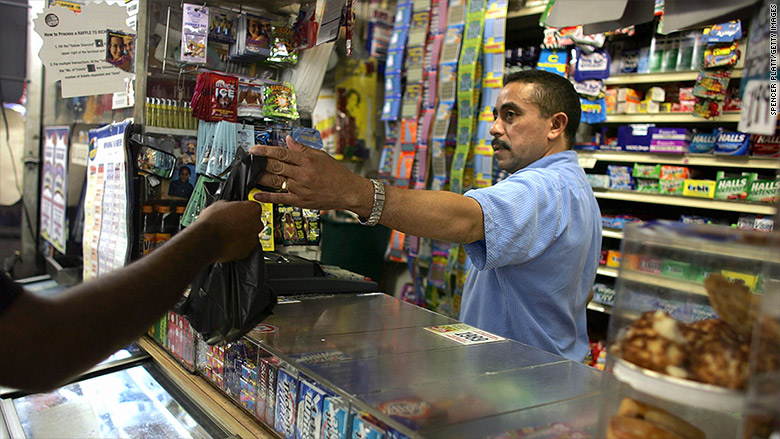 America’s Latino entrepreneurs are lying in wait — sitting on a potential $1.4 trillion in revenue boost to the economy. But a series of financial and cultural hurdles are blocking their progress.
America’s Latino entrepreneurs are lying in wait — sitting on a potential $1.4 trillion in revenue boost to the economy. But a series of financial and cultural hurdles are blocking their progress.
That’s the finding of a recent report by the Stanford Graduate School of Business that surveyed roughly 1,800 businesses owned by Latinos.
Latino entrepreneurs are extremely active. Latinos opened 86% of all the new businesses created in the U.S. between 2007 and 2012, according to Remy Arteaga, the lead researcher. But they lagged non-Latino businesses in how much revenue they brought in — $155,806 in 2012 versus $573,209, according to the most recent U.S. Census data.
“When you start looking at that difference, you realize how much money is being left on the table,” said Jerry Porras, professor of organizational behavior and change at Stanford’s business school.
The biggest issue? A lack of access to capital.
More than half of the those surveyed by Stanford said they were failing to grow due to inadequate funding.
The researchers pointed to the lack of a pipeline between investors and Latino-owned businesses and a dearth of financial education, as well as cultural issues within the Latino community.
Related: Immigrants, these cities want you!
Many of the survey’s respondents said they had been turned down for funding, primarily by banks. And the researchers noted that less than 1% of companies that receive venture capital funding are Latino-owned.
Edrizio De La Cruz is the Dominican-born founder and CEO of a company that has secured $6 million in venture funding and just closed its second round. His company, Regalii, was launched in 2013 and provides technology that helps people remotely pay bills of family and friends in other countries.
“I came to live with my dad in the ’90s and I always sent money back home to my mom,” said De La Cruz, whose business is based in New York’s Washington Heights neighborhood, where he grew up.
De La Cruz attended the Wharton Business School’s graduate program, which he said gave him the knowledge and connections he needed to get Regalii off the ground.
De La Cruz is an anomaly among the Latino community, however.
Stanford’s researchers found that many Latino businesses are unaware of different funding sources available to them. Many also seem resistant to seeking outside funding altogether.

Over half of the Latino businesses in the Stanford survey said they have never requested outside funding, and about two-thirds of respondents said they felt uncomfortable sharing equity with outsiders, fearing they would lose control of their business.
“It’s partly cultural,” Porras said. “Family is important, and many Latinos feel uncomfortable going beyond it.”
About 92% of the businesses surveyed by Stanford tapped money from family and friends. Other funding usually came from personal loans — either from banks or from credit cards — not business loans.
When Latino entrepreneurs did seek outside funding, researchers found that 42% of respondents were rejected by banks and commercial lenders.
Georgina Randazzo started her office furniture company, Facilitec, with next to nothing. “Just a $2,000 deposit from a client,” she said.
“Some of our big challenges were things like getting credit,” said Randazzo, who was born in Mexico City and moved to the U.S. when she was a child.
At first, she secured personal loans and took a small loan from her sister in Mexico. Eventually, she transferred the loans to commercial loans, putting her home down as collateral.
“We started our business in 1993, and in 1995 we were looking to shut it down.” That year Boeing hired the company, enabling it to stay afloat.
Still, she didn’t get a Small Business Administration loan until 2006 to expand. “Even SBA loans need to be backed up, and when you don’t have much, you can’t back it up,” she said.
Last year was Facilitec’s best year — with $16 million in sales, Randazzo said.
Georgina and her husband Mark are now thinking about selling the business to their son.
“Luckily, the Latino culture encourages entrepreneurship,” said Porras. “But the companies being created are subsistence-businesses. They’re not creating wealth for the owners.”
To help Latino entrepreneurs gain traction, Porras founded Latino Business Action Network, a non-profit that collaborates with Stanford on the Latino Entrepreneurship Initiative, that identifies Latino-owned companies that are primed to grow into firms making at least $1 million in revenue and puts them through a six-week intensive program.
In the winter of 2015, the first class of 78 Latino entrepreneurs completed the program, which included interviews with successful Latino business people, mentoring, and networking with venture capitalists and angel investors.
